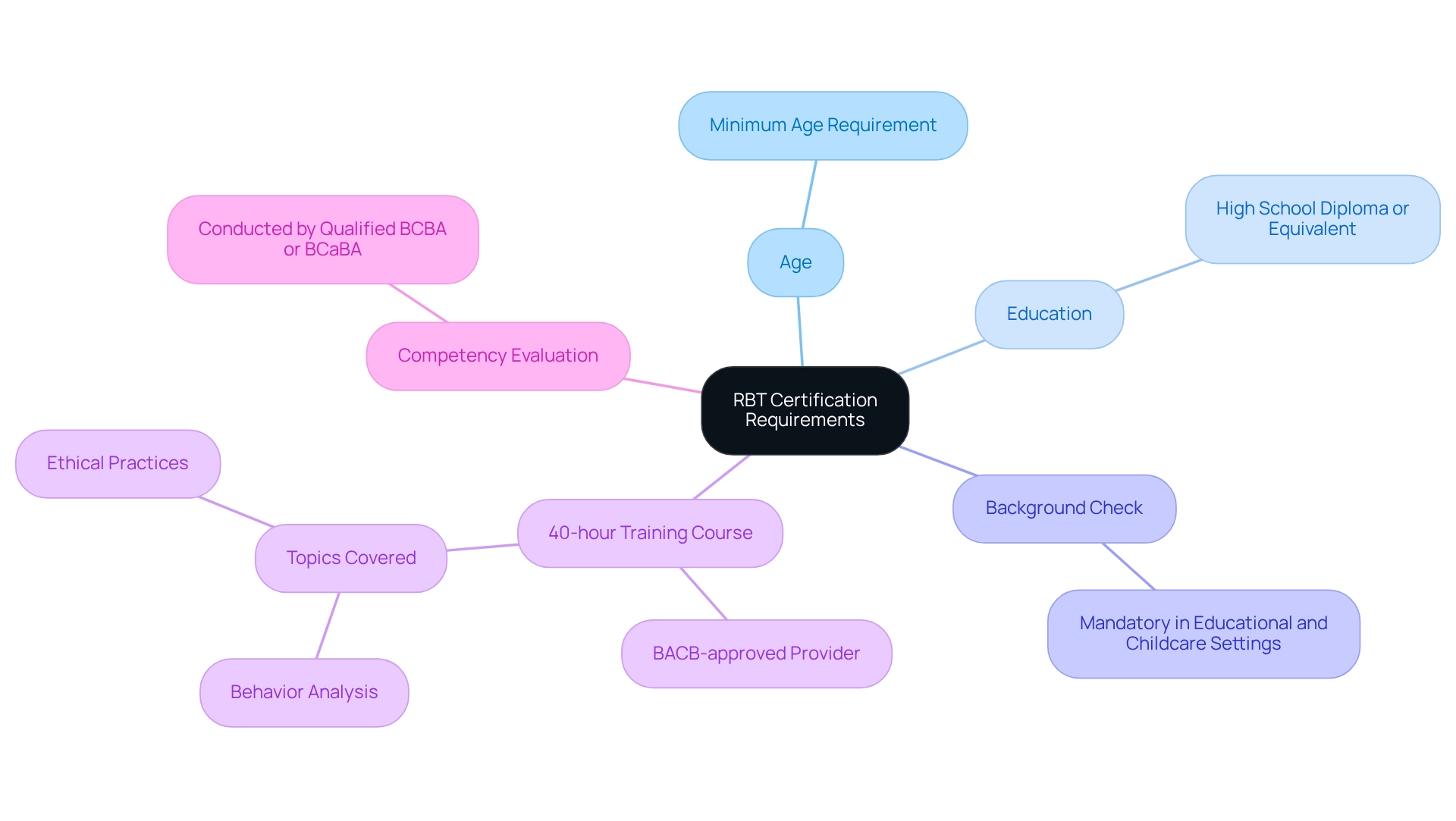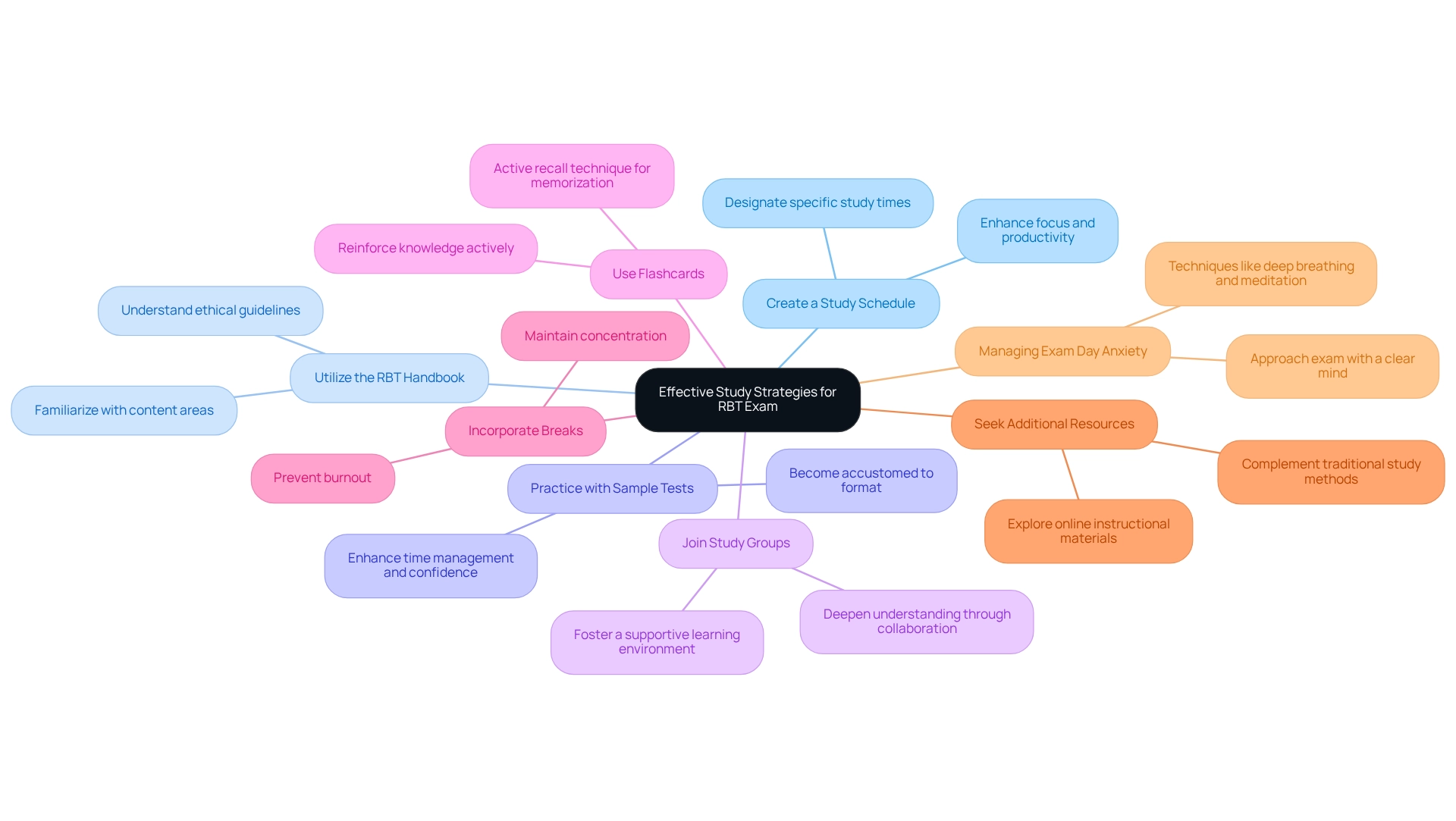June 1, 2025

The article outlines the essential steps and requirements for obtaining the Registered Behavior Technician (RBT) license.
With a growing demand for RBTs in the field of applied behavior analysis, it is crucial to complete a 40-hour training course, pass a competency evaluation, and successfully navigate the application process.
Each step is detailed, providing study strategies that highlight the significance of thorough preparation for certification success.
Are you ready to take the next step in your career? The importance of being well-prepared cannot be overstated, as it directly impacts your chances of success in this competitive field.
In the evolving landscape of applied behavior analysis, the role of a Registered Behavior Technician (RBT) has become increasingly vital. With the demand for qualified professionals on the rise, understanding the certification requirements and the steps necessary to achieve RBT status is crucial for aspiring candidates.
This comprehensive guide delves into the essential pathways to certification, effective study strategies, and common challenges faced during the exam process.
Are you prepared to navigate the complexities of certification? With insights into overcoming these challenges and tips for successful preparation, this article equips future RBTs with the knowledge needed to thrive in a rewarding career dedicated to supporting individuals with Autism Spectrum Disorder and other behavioral needs.
To become a Registered Behavior Technician (RBT), individuals must meet specific eligibility requirements for the RBT license.
Understanding these requirements is the first step toward successful qualification, ensuring candidates are adequately prepared for the subsequent phases of the process. Notably, the demand for skilled RBTs is on the rise, with significant growth observed in credentialing trends from 2016 to 2021. Research indicates that while RBT qualifications have increased substantially, their distribution is uneven, with certain states exhibiting higher concentrations of RBTs than others. Alarmingly, there are ten counties with the largest number of children diagnosed with Autism Spectrum Disorder (ASD) that lack both RBTs and BCBAs, including six counties in Minnesota. As the field continues to expand, understanding and fulfilling these qualification requirements is vital for aspiring RBTs who aim to obtain their RBT license and contribute effectively to the ABA community. Moreover, the Council of Autism Service Providers highlights that the provision of telehealth services is significantly less expensive than in-person services, underscoring the importance of accessible RBT services in meeting the needs of families and children with ASD.

The process of obtaining the RBT license is a pivotal journey for those aspiring to excel in applied behavior analysis, comprised of several essential steps designed to ensure individuals are thoroughly prepared for their careers.
Achieving RBT status demands dedication and meticulous planning. Individuals who devise a systematic study schedule and allocate specific hours for training can navigate the qualification process effectively. With the demand for BCBAs projected to surge by 25% by 2026, pursuing an RBT license unlocks substantial career advancement opportunities for those committed to advancing their education in this rewarding field.
To prepare effectively for the RBT exam, candidates should adopt the following study strategies:
The RBT evaluation is divided into three sections: measurement, assessment, and intervention, so understanding these areas is vital for effective preparation. Candidates are encouraged to start by thoroughly reviewing the RBT license Task List provided by the Behavior Analyst Certification Board (BACB). Alongside these strategies, individuals are encouraged to celebrate their progress throughout their preparation journey. Methods for handling test day anxiety, like deep breathing and meditation, can also be advantageous. A case study on handling test day anxiety emphasizes that by using these techniques, candidates can approach the assessment with a clear mind, read questions attentively, and make informed decisions, improving their likelihood of success. Moreover, continuing to learn after completing the assessment is crucial for ongoing professional development.

Individuals preparing for the RBT assessment often confront a variety of challenges in obtaining their RBT license. Understanding these common issues, along with effective strategies to address them, is essential for success.
Test Anxiety can pose a significant barrier. To combat this, employ relaxation techniques such as deep breathing or visualization. Engaging in practice tests can also bolster confidence and mitigate anxiety. As noted by Rori Care, BCBA certification enhances the standard of behavior analysis practice, ensuring professionals are equipped to implement evidence-based practices, which can alleviate some anxiety through preparedness.
Effective time management during the assessment is crucial. If faced with a challenging question, mark it and move on, returning to it later if time permits. This approach helps maintain momentum and reduces stress. Statistics indicate that many RBT test participants struggle with time management; thus, devising a plan to prioritize questions can be advantageous.
Understanding Question Wording is vital, as the technical language in some questions can be confusing. Take your time to read each question carefully, breaking it down into simpler terms if necessary to ensure comprehension.
Study Material Overload is another common issue. With a plethora of resources available, it’s easy to feel overwhelmed. Focus on a few high-quality materials, such as the RBT Handbook and reputable study guides for the RBT license, rather than attempting to cover every resource, as inconsistent study habits can hinder progress. Establish specific goals and hold yourself accountable. Utilizing a planner or study app can help track your progress and maintain organization.
Lack of Practical Experience is a frequent concern, leaving many feeling unprepared for the competency assessment. Seek hands-on practice opportunities under the supervision of a BCBA to enhance your confidence and skills before the exam. This practical experience is invaluable in solidifying your knowledge and readiness. For instance, Jenna, a BCBA in Texas, successfully balances her career and family responsibilities while earning a competitive salary, illustrating the potential for financial stability and professional fulfillment in the field of behavior analysis.
The journey to becoming a Registered Behavior Technician (RBT) is both challenging and rewarding, defined by essential steps that prepare candidates for their roles in applied behavior analysis. Understanding the certification requirements forms the foundation for aspiring RBTs, highlighting the necessary qualifications, training, and assessments needed to enter this vital field. With the demand for RBTs steadily increasing—particularly in regions with high rates of Autism Spectrum Disorder diagnoses—the need for qualified professionals has never been more critical.
Following a structured certification process enables candidates to build the essential skills and knowledge for success. Completing the required training, passing the competency assessment, and excelling in the exam are all pivotal steps that contribute to a comprehensive understanding of behavior analysis principles. Effective study strategies, such as creating a study schedule, utilizing the RBT Handbook, and engaging in practice exams, are crucial for candidates to navigate the certification process's complexities. Overcoming common challenges, including test anxiety and time management issues, further enhances the likelihood of success on exam day.
Ultimately, pursuing RBT certification not only opens doors to fulfilling career opportunities but also plays a significant role in supporting individuals with behavioral needs. By equipping oneself with the necessary tools and knowledge, aspiring RBTs can make a meaningful impact in the lives of those they serve. As the field of behavior analysis continues to grow, the commitment to professional development and ongoing learning remains essential for achieving long-term success in this vital profession.
What are the age requirements to become a Registered Behavior Technician (RBT)?
Candidates must be at least 18 years old to qualify for the RBT license.
What educational qualifications are necessary for RBT certification?
A high school diploma or equivalent is required to become a Registered Behavior Technician.
Is a background check required for RBT candidates?
Yes, a criminal background check is mandatory, especially in educational and childcare settings.
What type of training is required for RBT certification?
Candidates must complete a 40-hour RBT training course from a BACB-approved provider, covering essential topics related to behavior analysis and ethical practices.
What is involved in the competency evaluation for RBT candidates?
After completing the training, candidates must successfully pass a competency evaluation conducted by a qualified BCBA or BCaBA.
Why is it important to understand the RBT qualification requirements?
Understanding these requirements is crucial for aspiring RBTs to ensure they are adequately prepared for the certification process and to contribute effectively to the ABA community.
What is the current demand for RBTs?
The demand for skilled RBTs is increasing, with significant growth in credentialing trends observed from 2016 to 2021.
Are there disparities in the distribution of RBTs across states?
Yes, there is an uneven distribution of RBTs, with certain states having higher concentrations than others.
What is the significance of telehealth services in relation to RBTs?
The Council of Autism Service Providers indicates that telehealth services are significantly less expensive than in-person services, highlighting the importance of accessible RBT services for families and children with Autism Spectrum Disorder (ASD).
Our expert recruitment strategies and AI-driven sourcing ensure that you receive top-notch candidates quickly, without compromising on quality. Whether you’re looking for BCBAs, Clinical Directors, or RBTs, we’ve got you covered.